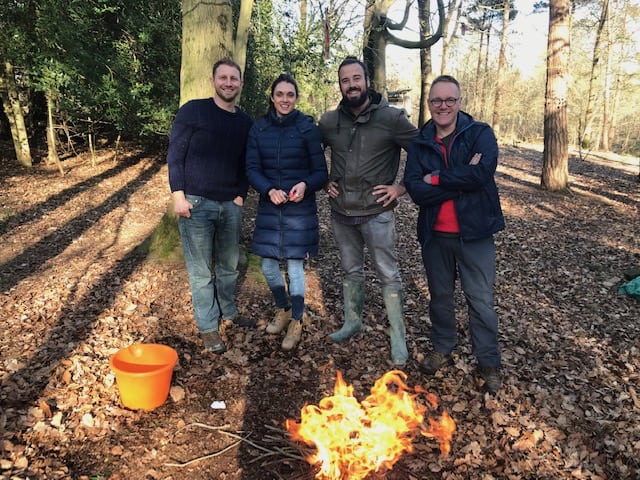|
What does burnout mean for your organisation and how can you use culture change and the power of nature to help your teams to thrive instead? Here’s a 5-step toolkit to cope with an always-on world. Words by Lauren Psyk
Photo by Victoria Heath on Unsplash
In a 24-hour, globally connected world, we are always-on - spending our entire lives connected to technology, with instant access to the world around us.
There are undoubtedly positive benefits to business and organisations from this state of 24-hour connectivity. You can be more productive by managing projects using cloud based tools; you’ve got the convenience of being able to access everything you need, from meals to travel, with the touch of a button; and you can easily serve international markets during their waking hours, as working across different time zones and having staff based across the globe is becoming de rigueur. However, it's also becoming clear that it’s not all sunshine and roses. You may be able to have a gourmet meal delivered at all hours of the day and night, but what is this state of being always-on doing to your mental and physical health, and the health of your team?
The challenge of 24/7 connectivity
These are just some of the reported side-effects of being always-on:
Ultimately, our current 24/7 work culture is leading to burnout. According to the 2016 Staples Business Advantage Workplace Index, it's estimated that burnout now affects 40% of employees and upwards of 95% of businesses worldwide. As a generation, Millennials seem particularly susceptible, an issue that’s explored in an influential and widely shared recent Buzzfeed article by Anne Helen Peterson.
What does burnout mean for your organisation?
Burnout fundamentally affects the way the brain functions, having an impact on everything from memory, creativity and problem solving, to emotional regulation and attention. Clearly, your team is not going to be able to offer peak performance and productivity when hindered in such a way. And studies have shown a clear correlation between burnout and a lack of job engagement. Since Millennials and Generation Z (the generation after Millennials) are going to make up an ever increasing chunk of the workforce, and are the leaders and innovators of tomorrow, it’s crucial to address the issues which affect them if you are to future-proof your organisation. What can you do about it? Tackling this widespread problem requires a change in culture and leadership style, towards one which enables employees to thrive; “More and more leaders view their role as actively empowering ‘thriving’ as a taproot from which inspired purpose, meaningful connections, and positive impact can grow for people and whole systems.” Renee Moorefield, CEO, Wisdom Works
Photo by Ben Duchac on Unsplash
A Toolkit to Help Your Teams to Thrive in a 24/7 Always-on Culture We’ve put together this handy 5-step toolkit to enable you to address this issue in your own organisation, helping you think about culture change and ways to prioritise ‘thriving’ for your staff: 1. Allow enough downtime. Make sure you don’t bother your staff out of working hours. Encourage your team to prioritise work-life balance (for example by making sure staff take a proper lunch break and don’t work overtime). Crucially, make sure you’re setting a good example with your own work behaviour. When was the last time you took a walk in the park on your lunch break? 2. Allow flexibility - Millennials are drawn to the idea of finding their own way of working. Move away from a rigid ‘one-size fits all’ approach and treat people as individuals, each with their own body clocks, needs and priorities. This means moving away from a ‘bums on seats’ mentality which assumes that people can only be productive when in front of a desk in the office. “We should focus on what people get done, not on how many hours or days worked.” Richard Branson 3. Encourage a strong sense of community. According to American social psychologist Christina Maslach, a healthy community is necessary to mediate the stresses of work: "People thrive in community and function best when they share praise, comfort, happiness, and humor with people they like and respect”. Ask yourself what you can do to increase positive social interactions between colleagues. 4. Get away from the office. If you’re struggling with a particular strategic problem, or looking for ways to decrease conflict and office politics, you might want to consider an offsite team building or away day. Getting away from your usual surroundings can help your team to look at organisational challenges in new ways, and taking time to connect and reflect can lead to enhanced alignment, and working together better. It really does work, as recent School of the Wild client, Emma Slawinski from Compassion in World Farming explains: “Being in the woods, without walls and in a natural environment gave us a new energy and sense of purpose. It 're-set' our ways of thinking and interacting with each other. It was like letting go of a breath we have been holding for a long time.” 5. Spend time in nature. You know all those negative impacts of burnout we mentioned earlier? Well, it’s true, nature is proven to mitigate them. Getting out of the office and into nature improves memory, creative thinking, problem solving abilities, and it’s a powerful remedy for distracted thinking. A recent article in The Times showed that even just 20 minutes in nature beats stress and improves wellbeing.
Space Doctors away day
Get out into the wild
In our changing world, with flexible working, the rise of digital, and pressures of an increasingly agile and distributed workforce, it's never been more important to get your team working together better. Away from your usual environment, School of the Wild’s human-centred team building days reconnect you with the wild and each other, giving you the space to build stronger bonds, and talk about things that matter. “Stillness, reflection and then inspiration from nature - all rare things in the craziness of the day-to-day. At a time when business as usual is no longer sustainable, this time gave us valuable distance and the headspace and perspective to re-evaluate what we do, for tomorrow. School of the Wild’s guidance was carefully delivered, credible and appreciated by all. Thank you, thank you. I’m loving watching the positive ripples from this time now we're back to work.” Dr. Fiona McNae, Space Doctors
Find out more about how a School of the Wild team building away day can help your team and your organisation quickly connect with each other, and explore a business issue together.
Comments are closed.
|
Author & CuratorNigel Berman is the founder of School of the Wild. Archives
March 2024
|
Leaders |
About Us
Support |
|





 RSS Feed
RSS Feed



